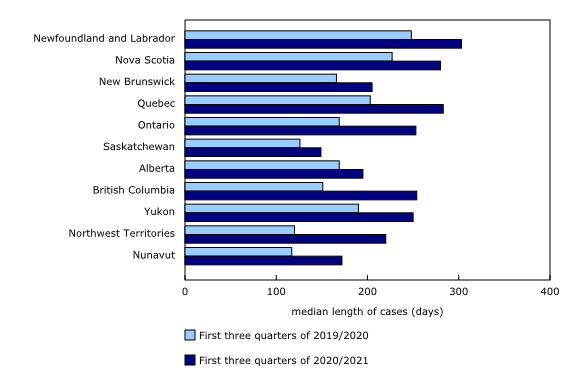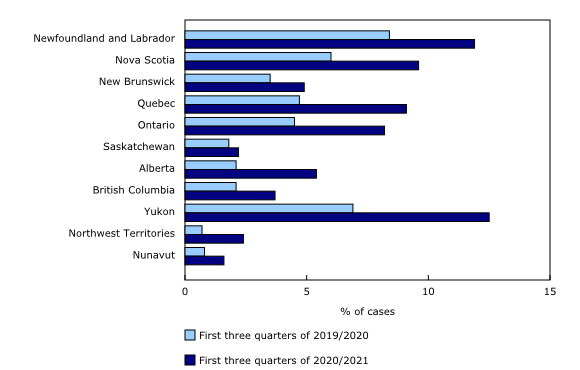Fewer adult criminal court cases were completed during the first three quarters of 2020/2021
Archived Content
Information identified as archived is provided for reference, research or recordkeeping purposes. It is not subject to the Government of Canada Web Standards and has not been altered or updated since it was archived. Please "contact us" to request a format other than those available.
Released: 2021-06-16
During the first nine months of the pandemic, the number of cases completed in adult criminal courts dropped by one-third compared with the same period the previous year. Furthermore, the proportion of completed adult criminal court cases that exceeded the Jordan limit―a ceiling set by the Supreme Court beyond which delays are presumed to be unreasonable and could result in a stay of proceedings―increased from 3.8% to 6.7%.
The pandemic has created unprecedented challenges for criminal courts in Canada. In many cases, traditional in-person hearings have been postponed or replaced with virtual hearings, and this urgent transformation has created delays.
In response to the growing need for more timely data on criminal courts, Statistics Canada is releasing, for the first time, preliminary quarterly data from the Integrated Criminal Court Survey (ICCS). Year-to-date data are presented and compared, because year-to-date data are more complete and comparable between jurisdictions than data for individual quarters.
These quarterly preliminary data provide a snapshot of the state of criminal courts in Canada to identify emerging trends sooner than previously possible using annual ICCS data. Data are available for youth court and adult criminal court, and by type of offence. Data for Newfoundland and Labrador Superior Court, Prince Edward Island and Manitoba were not available and are therefore excluded from these results.
Court activity slowed during the first three quarters of 2020/2021
There were significantly fewer adult criminal court cases (-30%) and charges (-27%) completed from April 1 to December 31, 2020, compared with the same period a year earlier. The number of cases fell from 219,072 during the first three quarters of 2019/2020 to 153,365 during the same period in 2020/2021. The number of charges declined from 800,592 to 584,797.
With the exception of Yukon, every reporting province and territory indicated that there were fewer completed cases and charges by the end of the third quarter of 2020/2021 compared with the same period in 2019/2020. The largest decrease was in Nunavut for both cases (-42%) and charges (-36%). Yukon, in contrast, reported 10% more completed cases and a 30% increase in completed charges.
Not only were fewer cases completed in the first three quarters of 2020/2021, but the majority of them took longer to complete.
Of all the adult criminal court cases completed in Canada during the first three quarters of 2020/2021, 15% were resolved within 7 days, up slightly from the same period the previous year (14%). This increase was largely due to a greater proportion of drug possession cases being resolved within 7 days. In the first three quarters of 2020/2021, 24% of drug possession cases were resolved within 7 days, compared with 12% during the first three quarters of 2019/2020.
For cases that were not resolved within 7 days, the median number of days required to complete a case by the end of the third quarter of 2020/2021 was 239―66 days longer than in the same period in 2019/2020 (173 days). Northwest Territories (+83%) and British Columbia (+68%) reported the largest increases in case time, and Alberta (+15%) the smallest.
More cases at risk of exceeding the Jordan limit
By the end of the third quarter of 2020/2021, 6.7% of completed adult criminal court cases had exceeded the Jordan limit, a ceiling set by the Supreme Court beyond which delays are presumed to be unreasonable and could result in a stay of proceedings. This was up 2.9 percentage points from the same period a year earlier (3.8%). In all reporting provinces and territories, the proportion of cases exceeding the Jordan limit was higher than during the same period in the previous year.
Among the cases that exceeded the Jordan limit, 42% were stayed or withdrawn, up 10 percentage points from the same period the previous year. However, ICCS data cannot show how many of these cases were stayed directly in response to a Jordan application.
Key indicators for the preliminary quarterly data are available in two new online tables (35-10-0171-01 and 35-10-0172-01).
Note to readers
Quarterly Integrated Criminal Courts Survey (ICCS) data are considered preliminary and represent the information available from those jurisdictions that are able to submit data within eight weeks of the end of the quarter.
Quarterly data are available by fiscal quarter as well as by fiscal year-to-date for the end of each quarter. The data analyzed in this release are year-to-date data at the end of the third fiscal quarter (December 31), and represent cases completed between the start of the fiscal year (April 1) and the end of December.
Data for Prince Edward Island are excluded from these analyses as the data for this jurisdiction were not available for the third quarter of 2020/2021. Also, Newfoundland and Labrador Superior Court and Manitoba only provide data on an annual basis and therefore cannot be included in this release.
ICCS data have historically been released annually. These data will continue to be produced and, once finalized, will provide a complete picture of criminal courts in Canada during the first full year of the pandemic.
In 2016, the Supreme Court of Canada released its R. v. Jordan decision. The R. v. Jordan decision set out a presumptive ceiling beyond which delays are considered unreasonable. Time limits for the completion of criminal cases are set out as follows: 18 months for cases tried in provincial court; and 30 months for cases tried in superior court or in provincial court following a preliminary inquiry. The Jordan decision allows for delays exceeding the presumptive ceiling to be justified on the basis of exceptional circumstances. Exceptional circumstances are those that are reasonably unforeseen or unavoidable and cannot be reasonably remedied once they arise.
Additional data are available upon request.
Contact information
For more information, or to enquire about the concepts, methods or data quality of this release, contact us (toll-free 1-800-263-1136; 514-283-8300; STATCAN.infostats-infostats.STATCAN@canada.ca) or Media Relations (613-951-4636; STATCAN.mediahotline-ligneinfomedias.STATCAN@canada.ca).
- Date modified:




